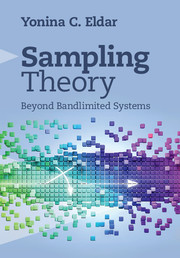Book contents
- Frontmatter
- Dedication
- Contents
- Preface
- 1 Introduction
- 2 Introduction to linear algebra
- 3 Fourier analysis
- 4 Signal spaces
- 5 Shift-invariant spaces
- 6 Subspace priors
- 7 Smoothness priors
- 8 Nonlinear sampling
- 9 Resampling
- 10 Union of subspaces
- 11 Compressed sensing
- 12 Sampling over finite unions
- 13 Sampling over shift-invariant unions
- 14 Multiband sampling
- 15 Finite rate of innovation sampling
- Appendix A Finite linear algebra
- Appendix B Stochastic signals
- References
- Index
7 - Smoothness priors
Published online by Cambridge University Press: 05 August 2014
- Frontmatter
- Dedication
- Contents
- Preface
- 1 Introduction
- 2 Introduction to linear algebra
- 3 Fourier analysis
- 4 Signal spaces
- 5 Shift-invariant spaces
- 6 Subspace priors
- 7 Smoothness priors
- 8 Nonlinear sampling
- 9 Resampling
- 10 Union of subspaces
- 11 Compressed sensing
- 12 Sampling over finite unions
- 13 Sampling over shift-invariant unions
- 14 Multiband sampling
- 15 Finite rate of innovation sampling
- Appendix A Finite linear algebra
- Appendix B Stochastic signals
- References
- Index
Summary
Until now we have assumed that the signal x being sampled lies in a known subspace. We saw that under an appropriate direct-sum condition, perfect recovery from the samples is possible. We now treat a less restrictive formulation of the sampling problem in which the only prior knowledge on the signal is that it is smooth in some sense. In our development, we consider two models of smoothness. In the first, the weighted norm ∥Lx∥ of x is bounded where L is an appropriate weighting operator, such as a differential operator. In the SI setting this corresponds to the assumption that the L2 signal-norm at the output of a continuous-time filter L(ω) with x(t) as its input is bounded. An alternative formulation is to assume that x(t) is a wide-sense stationary (WSS) process with known spectrum. We will see that under appropriate objective functions, these two priors lead to the same recovery methods with the weighting function L chosen as the whitening filter of the process x(t). Relevant background on WSS signals and whitening is summarized in Appendix B.
Unlike subspace priors, a one-to-one correspondence between smooth signals and their samples does not exist, since smoothness is a far less restrictive constraint than confining the signal to a subspace. Perfect recovery, or even error-norm minimization, is therefore generally impossible. Instead, we focus on LS and minimax approaches for designing the reconstruction system in both the unconstrained and constrained recovery scenarios.
Information
- Type
- Chapter
- Information
- Sampling TheoryBeyond Bandlimited Systems, pp. 237 - 282Publisher: Cambridge University PressPrint publication year: 2015
